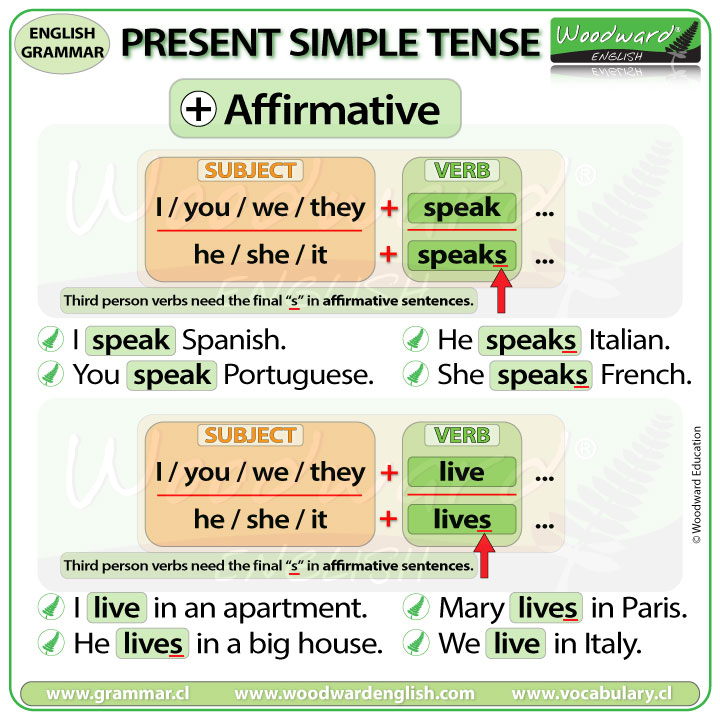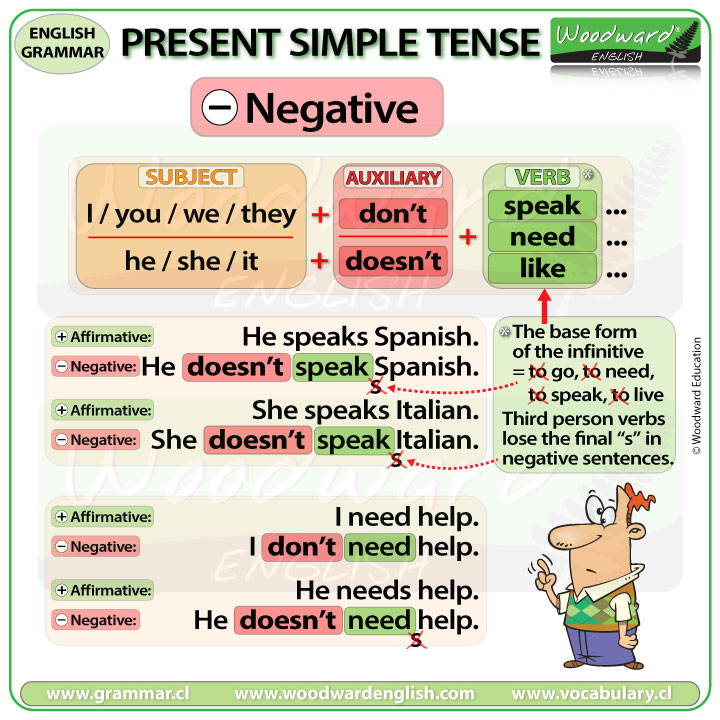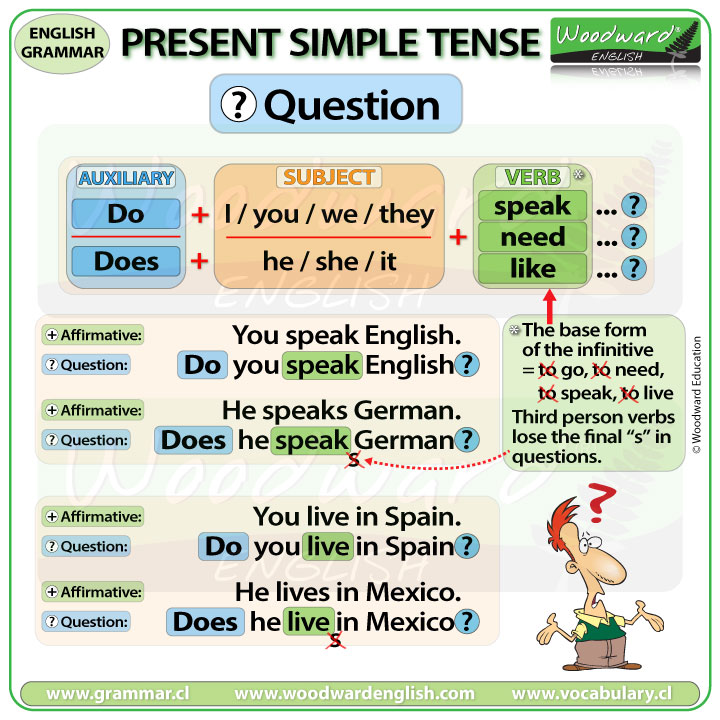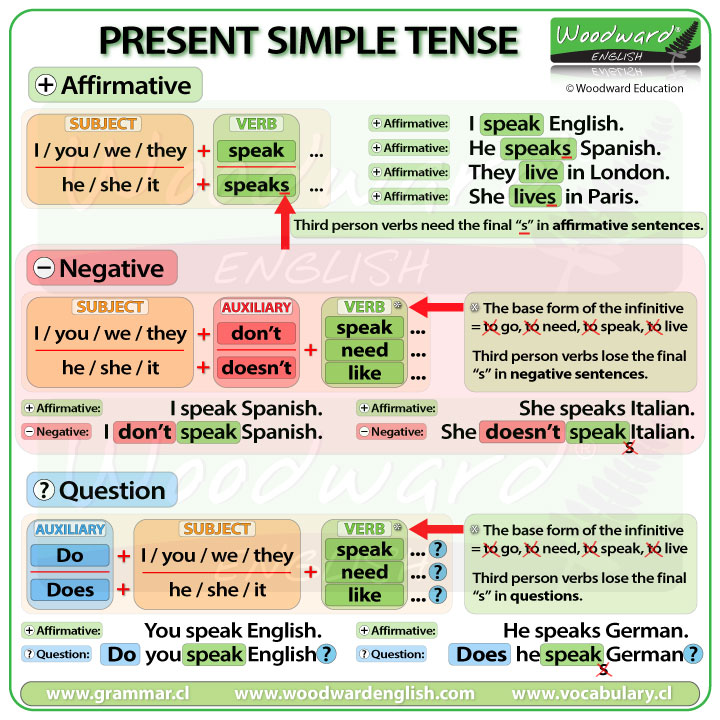I Need a Simple
Present Uncomplicated Tense in English language – Easy English Lesson
- I speak English language.
"I" is a field of study. In general, a person.
"Speak" is a verb. In general, an activeness.
You can alter the subject. For example:
- You speak English
- We speak English language
- They speak English
BUT, sometimes the verb changes. We say:
- I speak …
- You lot speak …
- We speak …
- They speak …
BUT, For He / She / It we employ SPEAKS with an Southward at the end.
The Due south is necessary at the end of a verb when the field of study is HE, SHE, or IT.
- He speaks…
- She speaks…
- It speaks…
Await at these examples:
- I speak Castilian.
- You speak Portuguese.
But…
- He speaks Italian.
The Southward is necessary at the end of the verb.
You lot cannot say:
- He speak Italian …. (No, this is NOT correct)
We need an Due south at the end of the verb. We say:
- He speaks Italian. (This is correct)
Another example:
- She speaks 4 languages.
English is a language, Spanish is a language, Portuguese is a language, Italian is a language.
- She speaks four languages.
Once more, the S is necessary at the end of speak.
Permit'southward expect at another verb. We say:
- I alive …
- You alive …
- We live …
- They alive …
Simply, for He / She / It we utilize LIVES with an Due south at the cease.
The S is necessary at the terminate of a verb when the subject is HE, SHE, or IT.
- He lives …
- She lives …
- It lives …
Expect at these examples:
- I live in a small apartment.
- He lives in a big house.
LIVES with an Southward at the end considering HE lives.
Now look at this sentence:
- Mary lives in Paris.
Why do we use LIVES?
Because Mary is SHE.
- SHE lives in Paris.
1 more than example:
- We live in … New Zealand.

Sometimes the verb changes a little for HE, SHE and IT (3rd person).
Wait at this verb: Take
We say:
- I have …
- You have …
- Nosotros accept …
- They have …
Simply, for He / She / It we use HAS.
We do Non say Haves… because the verb is irregular.
Look at these examples:
- I have a good thought.
- You accept blackness pilus.
- She has a lexicon.
- John has blue eyes.
We volition learn more about these types of tertiary person changes in another lesson.
Negative Sentences – Present Simple Tense
Wait at this sentence:
- They speak English.
This is an affirmative sentence.
How tin can I make this a NEGATIVE sentence?
In English, we utilize don't and doesn't to make a negative sentence in nowadays unproblematic tense.*
- They speak English language. … becomes …
- They don't speak English language.
Don't shows that the sentence is negative.
We don't say:
- They no speak English language. (No, this is NOT right)
Nosotros say:
- They don't speak English language. (Yeah, this is CORRECT)
Note: We employ don't and doesn't to brand a negative sentence in the present simple tense.
* Exceptions: Negative sentences that use To Be or Modal Verbs (can, might, must, etc.)
What is the difference between DON'T and DOESN'T?
Look at this chart:

When the subject is I, YOU, WE or THEY … we use don't before the verb.
When the subject field is HE, SHE or IT … nosotros apply doesn't before the verb.
DON'T is a contraction of Practice NOT.
DOESN'T is a contraction of DOES NOT.
Afterward don't and doesn't nosotros have a VERB.
This verb is the base form of the infinitive.
The infinitive is the original form of the verb earlier it is conjugated or changed.
The infinitive is to go, to demand, to speak, to live.
Just we want the BASE form of the infinitive… this is without the TO at the first.
- Instead of TO Go, only Get.
- instead of TO Need, only Need.
- Instead of TO SPEAK, only SPEAK.
- Instead of TO Live, simply Alive.
Let's await at the example of the verb SPEAK. Nosotros say:
- I don't speak …
- You don't speak …
- We don't speak …
- They don't speak …
For example, the affirmative:
- I speak Castilian.
What is the negative form?
The negative is:
- I don't speak Castilian.
Another example: The affirmative:
- We speak Italian.
What is the negative course?
The negative is:
- We don't speak Italian.
BUT, expect at this affirmative sentence:
- He speaks Spanish.
What is the negative grade of this sentence?
- He doesn't speak Spanish.
There is NO S at the end of 'speak' in the negative judgement. Why?
We use the base grade of the infinitive. The infinitive is TO SPEAK, we only want the base class, which is SPEAK.
Third person verbs lose the final S in negative sentences.
- I don't speak …
- He doesn't speak …
The verb in negative form will always be SPEAK without an S.
Let'due south expect at another example:
- She speaks Italian.
What is the negative form of this sentence?
- She doesn't speak Italian.
Again, at that place is NO Southward at the end of 'speak' in the negative sentence.
Let'southward await at another verb: NEED.
The affirmative sentence is:
- I need help.
What is the negative course of this sentence?
- I don't need assist.
And this affirmative sentence:
- He needs aid.
We need the S at the cease for the third person in affirmative sentences.
What is the negative form of this sentence?
- He doesn't need aid.
Over again, no South at the end of the verb considering it is a negative sentence.
Let'south look at another verb: LIKE.
The affirmative sentence is:
- I like football game.
What is the negative form of this sentence?
- I don't like football.
And this affirmative judgement:
- He likes football.
Nosotros need the Due south at the stop for the third person in affirmative sentences.
What is the negative grade of this sentence?
- He doesn't like football game.
Again, no S at the cease of the verb because it is a negative sentence.
Questions – Nowadays Uncomplicated Tense
Look at this sentence.
- You speak English language.
This is an affirmative sentence. What is the question?
- DO you speak English?
In English, nosotros utilize DO and DOES to make questions in present elementary tense.*
* Exceptions: Questions that take To Be or Modal Verbs (tin, might, must, etc.)
- You speak English language. (Affirmative sentence)
- Exercise you speak English? (Question)
The give-and-take Do at the beginning tells us it is a question.
Wait at the chart:

Do is used for questions with I, you lot, we, and they.
Does is used for questions with he, she, and it.
Also the same rules apply to the verb in questions.
We use the base form of the infinitive.
For instance, the affirmative sentence:
- He speaks German.
At that place is an S at the end of speaks because the discipline is HE and it is an affirmative sentence.
What is the question?
- Does he speak German?
No Due south at the end of speak because we need to base form of the infinitive.
Another example:
- You alive in Espana.
This is an affirmative sentence.
How can we change this to a question?
- Do you live in Spain?
The Practice tells us information technology is a question.
Some other affirmative sentence:
- He lives in Mexico.
Notice the South at the terminate of lives considering the subject area is HE and it is an affirmative sentence.
How can we change this to a question?
- Does he live in Mexico?
No South at the cease of live because we need to base of operations form of the infinitive.
Present Uncomplicated Tense – Summary Nautical chart

I hope yous institute this English language lesson about the Present Unproblematic Tense useful.
If you did, delight let other people know almost this lesson.
Source: https://www.woodwardenglish.com/lesson/present-simple-tense-in-english/
0 Response to "I Need a Simple"
Post a Comment